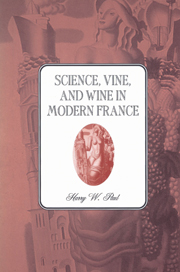Book contents
- Frontmatter
- Contents
- List of Tables and Figures
- Acknowledgments
- Map of France
- Introduction
- Part I Reinventing the Vine for Quality Wine Production
- Part II Laying the Foundations of Oenology
- Part III Oenology in Champagne, Burgundy and Languedoc
- 7 Champagne: The Science of Bubbles
- 8 Burgundy: The Limits of Empirical Science
- 9 Languedoc-Roussillon: Innovations in Traditional Oenology
- Part IV Oenology in Bordeaux
- Conclusion: Mopping-up Operations or Contemporary Oenology as Normal Science
- Select Bibliography
- Index
8 - Burgundy: The Limits of Empirical Science
Published online by Cambridge University Press: 19 October 2009
- Frontmatter
- Contents
- List of Tables and Figures
- Acknowledgments
- Map of France
- Introduction
- Part I Reinventing the Vine for Quality Wine Production
- Part II Laying the Foundations of Oenology
- Part III Oenology in Champagne, Burgundy and Languedoc
- 7 Champagne: The Science of Bubbles
- 8 Burgundy: The Limits of Empirical Science
- 9 Languedoc-Roussillon: Innovations in Traditional Oenology
- Part IV Oenology in Bordeaux
- Conclusion: Mopping-up Operations or Contemporary Oenology as Normal Science
- Select Bibliography
- Index
Summary
Eighteenth-Century Research Schemes for Improving Wine
The old pre-Chaptalian practical viticultural and oenological science had not been without its texts. The third section of the Théâtre d'agriculture et mesnage des champs (1600) by Olivier de Serres contained over a hundred pages of “science” and practice on vine and wine. Le nouveau théâtre d'agriculture et ménage des champs… (1713), by the Sieur Louis Liger contained five short chapters on the vine and winemaking. The substantial Mémoire sur la meilleure manière de faire et de gouverner les vins de Provence (1772) by the abbe Rozier summed up existing wisdom while criticizing traditional practices and calling for improvements, with an emphasis on cleanliness. In L'art de faire le vin (1772), Maupin also criticized the weight of tradition and ignorance in winemaking. Criticizing tradition was one of the literary devices of reformist works. Of course, authors were no less wrong in adopting this conventional strategy. Some traditions disappear, some are invented, and some undergo so many small modifications that they become a different species of tradition. Burgundian winemaking changed in its details as people's taste in wine altered over the centuries: different epochs, different versions of the same wine.
In the Enlightenment, science was part of the intellectual baggage of the professional classes and cultured men and women. Voltaire wrote on Newton and lesser minds studied the grape. Science is, among other things, an efficient system for ensuring the survival of ideas and practices.
- Type
- Chapter
- Information
- Science, Vine and Wine in Modern France , pp. 230 - 259Publisher: Cambridge University PressPrint publication year: 1996



